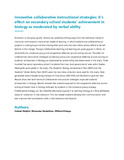| dc.contributor.author | Adejimi, Saheed | |
| dc.contributor.author | Nzabalirwa, Wenceslas | |
| dc.contributor.author | Shivoga, William | |
| dc.date.accessioned | 2021-07-09T10:30:53Z | |
| dc.date.available | 2021-07-09T10:30:53Z | |
| dc.date.issued | 2021-06-21 | |
| dc.identifier.uri | https://doi.org/10.31129/LUMAT.9.1.1397 | |
| dc.identifier.uri | https://journals.helsinki.fi/lumat/article/view/1397 | |
| dc.identifier.uri | http://ir-library.mmust.ac.ke/123456789/1773 | |
| dc.description.abstract | Education is changing rapidly. Schools are gradually shifting away from the traditional mode of instruction and toward a more active model of learning, in which students are collaborating on projects in small groups and then sharing their work with the class. Africa cannot afford to be left behind in this change. Though collaborative teaching and learning are quite popular in Africa, its variants/forms, consensus group and cooperative reflective journal writing are not. The effect of collaborative instructional strategies (consensus group and cooperative reflective journal writing) on students' achievement in biology as moderated by verbal ability was determined in this study. Three hundred five senior secondary school II students from two local governments' area within Ibadan Metropolis participated in the study. The Students' Biology Achievement Test (SBAT) and the Students' Verbal Ability Test (SVAT) were the main data collection tools used for this study. Data generated were analysed using Analysis of Covariance (ANCOVA) and Bonferonni post hoc test. Results show that both forms of collaborative instructional strategies improved students' achievement in biology. Results showed that students exposed to the cooperative reflective journal writing achieved more in biology followed by students in the consensus group strategy. Collaborative strategy can be a feasible alternative approach to teaching biology as it fairly addresses issues of interaction in the classroom. This has helped students develop their communication and also improve their socialisation skills in the classroom and beyond. | en_US |
| dc.language.iso | en | en_US |
| dc.publisher | international journal on math, science and technology education | en_US |
| dc.subject | Innovative, collaborative, instructional, strategies, it’s effect , secondary, school, students’, achievement , biology , moderated, verbal, ability | en_US |
| dc.title | Innovative collaborative instructional strategies: it’s effect on secondary school students’ achievement in biology as moderated by verbal ability | en_US |
| dc.type | Article | en_US |

